 Petzlover
PetzloverCircassian Orloff Wolfhound is originated from Russia but Perro de Toro is originated from Spain. Circassian Orloff Wolfhound may grow 12 cm / 5 inches higher than Perro de Toro. Both Circassian Orloff Wolfhound and Perro de Toro are of same weight. Both Circassian Orloff Wolfhound and Perro de Toro has almost same life span. Circassian Orloff Wolfhound may have more litter size than Perro de Toro. Circassian Orloff Wolfhound requires Moderate Maintenance. But Perro de Toro requires Low Maintenance
Very little is known of the history and development of the Circassian Orloff Wolfhound. It is suspected that it is related to the Hare Hound, Deerhound and the Greyhound. They were taken from Siberia to the Circassian southern mountains to hunt hare and small prey. The breed is also like the Borzoi but more intelligent and it is much faster than the other sighthounds.
The color and some other minor characteristics have evolved over the centuries to be different from the Siberian that was originally brought to the mountains. All the historical data suggests that the original parents of all these sighthounds was the Celtic Greyhound
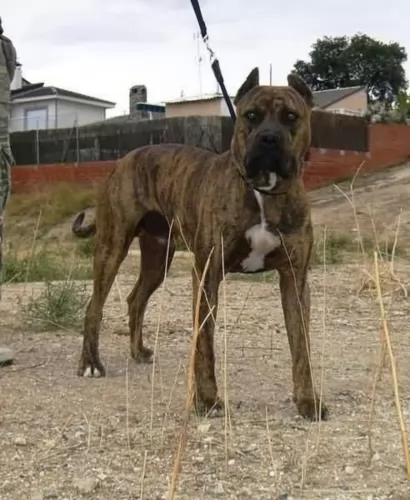 The rare Spanish Perro de Toro seems to have unclear origins, with some saying the dog is a direct descendant of the Toulouse Mastiff, while others say that the dog was developed by crossing the Alano with the Dogue de Bordeaux.
The rare Spanish Perro de Toro seems to have unclear origins, with some saying the dog is a direct descendant of the Toulouse Mastiff, while others say that the dog was developed by crossing the Alano with the Dogue de Bordeaux.
The dog hails from Spain and was once used as a fighting kind of dog but today it is essentially a family pet. The dog is an ancient breed, an ancestor of many of the molosser breeds that are around today.
The Circassian Orloff Wolfhound had many of the characteristics of any sighthound. He has strong straight legs and they are longer than most sighthounds which allows the Circassian to run amazingly fast. The head is long, the muzzle is wide, and the eyes are large and dark. They have a deep chest and medium tail. They also have a graceful and aristocratic demeanor.
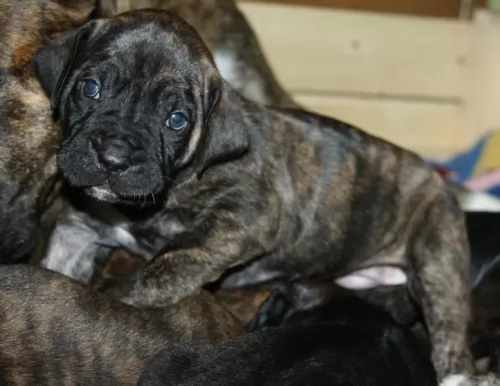 This is a strong, powerful, large breed of dog, making a good watchdog and guardian. He can be anything from 56 to 64cm in height and weigh between 34 and 40kg.
This is a strong, powerful, large breed of dog, making a good watchdog and guardian. He can be anything from 56 to 64cm in height and weigh between 34 and 40kg.
The nose of the dog is broad and black, the ears are set high and droop over slightly,making them floppy ears, but they have always been cropped to stand up erect.
He's a sturdy dog and the tail is fairly thick at the base, tapering to a point. These days it tends to be undocked and left long. The neck is strong and powerful too and the head brachycephalic. The short coat includes colors such as yellow, grey, fawn and red with the black mask.
The Spanish Bulldog looks fairly intimidating and he will certainly need training and socialization if he is to be obedient and well behaved.
He isn’t aggressive but is confident, dominant, fearless, loyal and also loving towards his owner. He is devoted towards his human family and is good with children. Like any mastiff type breed, he will need a firm, kind, consistent, patient owner. This is the kind of owner who will understand this breed type and take time out with him to exercise him and provide him with mental and physical stimulation so as to prevent boredom.
Fun and games are right in this breeds wheelhouse. They love to run. They need to run. Their activity level is very high, and they need lots of space and regular exercise. They are very intelligent and need mental stimulation as well. They are great at lure coursing and they love racing of course
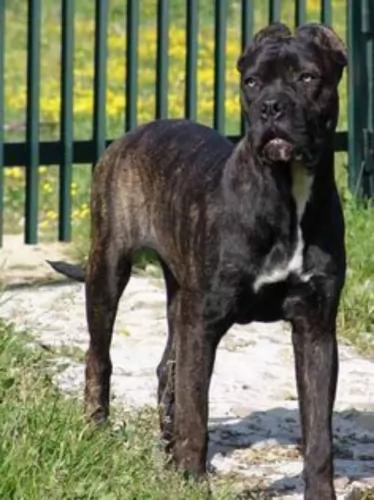 Contrary to what many people think, the temperament of the Perro de Toro is calm and well balanced. This is a reliable, loving, loyal dog who wants to protect his human family.
Contrary to what many people think, the temperament of the Perro de Toro is calm and well balanced. This is a reliable, loving, loyal dog who wants to protect his human family.
He gets on well with children and with pets in the home and when trained and socialized, this intelligent dog is well mannered, obedient and sometimes even submissive.
True, the Perro de Toro has a history of being involved in all kinds of things, from hunting to fighting and also being a working dog, but he is now waiting to show you what a splendid pet he can be if he is raised by the right kind of people.
Again, little is known about the health of this ancient breed, except to propose that it faces many of the same challenges as the Greyhound. This would include skin irritation, bloat, osteosarcoma and esophageal achalasia.
Esophageal achalasia is rare and affects the esophagus’ muscles. The upper muscles can’t relax and that causes the lower muscle or sphincter not to open and no food can get to the stomach.
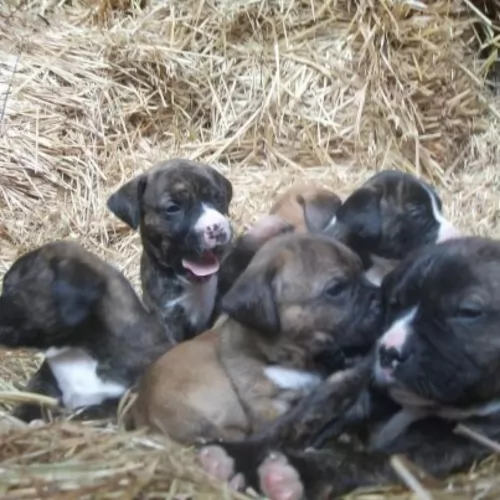 This is a dog breed that is fit and healthy, but to keep him that way you want to make sure he has enough exercise, love and nutritious food.
This is a dog breed that is fit and healthy, but to keep him that way you want to make sure he has enough exercise, love and nutritious food.
He is not known to suffer from any particular disease, but even so, it is wise to be aware of some of the common dog illnesses that your dog could pick up so you can get veterinary help for him just as soon as possible.
With cancer, cells grow rapidly and invade tissue. Dogs can get any of the many cancers there are. Both hereditary and environmental factors can contribute to the development of cancer in canines. Cancer can show up as lumps, swelling, sores that won’t heal, weight loss and difficulty with breathing.
Heartworms are transmitted from one animal to the next by mosquitoes. These worms live in the heart and pulmonary arteries of an infected animal, travelling through the bloodstream and causing havoc. Heartworm is dangerous and can actually be life threatening. Symptoms include coughing, vomiting, battling to breathe and weight loss.
This is a viral disease that can strike terror in anybody who has seen an animal with rabies. It affects the brain and spinal cord of your dog. It is preventable through means of a vaccine. Once symptoms appear, it is a disease which is nearly always fatal.
This dog is a lean running machine. Do not overfeed. It is also better to feed him two to three times a day in smaller portions rather than one large meal.
They tend to be allergic to insecticide and anesthesia. It’s best not to treat your yard for insects if your Circassian Orloff Wolfhound will be out in it.
Fun and games are right in this breeds wheelhouse. They love to run. They need to run. Their activity level is very high, and they need lots of space and regular exercise. They are very intelligent and need mental stimulation as well. They are great at lure coursing and they love racing of course.
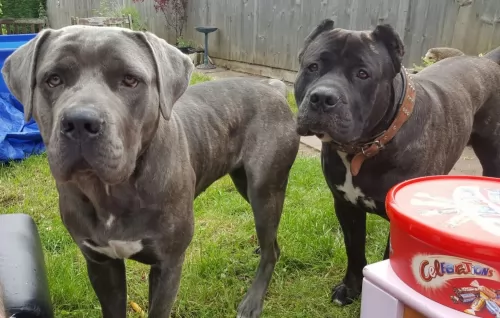 If they are not being used as working dogs, they are family pets, and you need to give them a lot of daily exercise. You will need to give him some walks or hikes and allow him a good run in the country.
If they are not being used as working dogs, they are family pets, and you need to give them a lot of daily exercise. You will need to give him some walks or hikes and allow him a good run in the country.
The Perro de Toro is a short haired dog, and as a moderate shedder, he isn’t going to require too much grooming. A brushing twice a week will help get rid of his hair.
When brushing him, turn it into a bit of a grooming session and check inside his ears, look at his eyes and try to look inside his mouth. He can’t tell you if he has terrible toothache from a rotting tooth and he will rely on you to check his teeth.
Mastiff type dogs need a wholesome diet to remain strong and active. If you are going to feed your pet one of the commercially manufactured dog foods, make sure it is one of the top quality ones.
Avoid the ones that use lots of colorants, preservatives and unhealthy fillers as these can make your dog sick. Try and give him some home-made food which can be added into his dry kibble occasionally.
Boiled chicken, brown rice or pasta and some vegetables such as carrots, sweet potato and spinach chopped up will be excellent for him and will ensure he doesn’t battle with digestive upsets. If you can, every now and then try to include some raw meat for the benefit and health of your pet. Never leave him without a bowl of fresh, cool water.